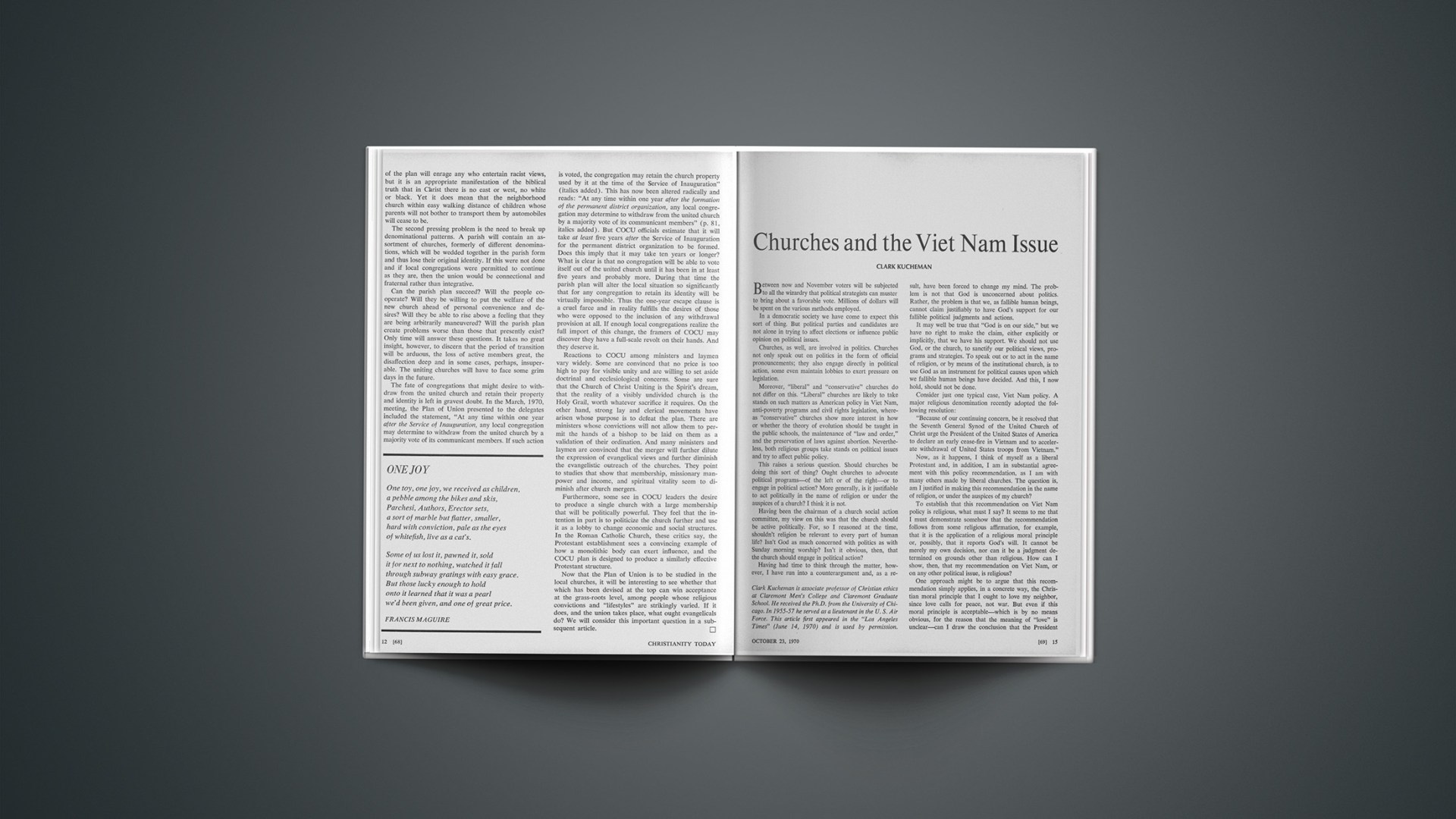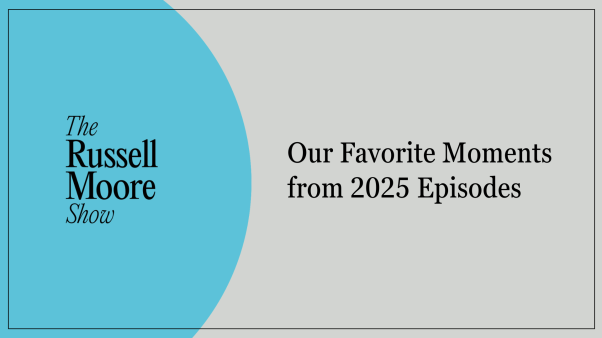Between now and November voters will be subjected to all the wizardry that political strategists can muster to bring about a favorable vote. Millions of dollars will be spent on the various methods employed.
In a democratic society we have come to expect this sort of thing. But political parties and candidates are not alone in trying to affect elections or influence public opinion on political issues.
Churches, as well, are involved in politics. Churches not only speak out on politics in the form of official pronouncements; they also engage directly in political action, some even maintain lobbies to exert pressure on legislation.
Moreover, “liberal” and “conservative” churches do not differ on this. “Liberal” churches are likely to take stands on such matters as American policy in Viet Nam, anti-poverty programs and civil rights legislation, whereas “conservative” churches show more interest in how or whether the theory of evolution should be taught in the public schools, the maintenance of “law and order,” and the preservation of laws against abortion. Nevertheless, both religious groups take stands on political issues and try to affect public policy.
This raises a serious question. Should churches be doing this sort of thing? Ought churches to advocate political programs—of the left or of the right—or to engage in political action? More generally, is it justifiable to act politically in the name of religion or under the auspices of a church? I think it is not.
Having been the chairman of a church social action committee, my view on this was that the church should be active politically. For, so I reasoned at the time, shouldn’t religion be relevant to every part of human life? Isn’t God as much concerned with politics as with Sunday morning worship? Isn’t it obvious, then, that the church should engage in political action?
Having had time to think through the matter, however, I have run into a counterargument and, as a result, have been forced to change my mind. The problem is not that God is unconcerned about politics. Rather, the problem is that we, as fallible human beings, cannot claim justifiably to have God’s support for our fallible political judgments and actions.
It may well be true that “God is on our side,” but we have no right to make the claim, either explicitly or implicitly, that we have his support. We should not use God, or the church, to sanctify our political views, programs and strategies. To speak out or to act in the name of religion, or by means of the institutional church, is to use God as an instrument for political causes upon which we fallible human beings have decided. And this, I now hold, should not be done.
Consider just one typical case, Viet Nam policy. A major religious denomination recently adopted the following resolution:
“Because of our continuing concern, be it resolved that the Seventh General Synod of the United Church of Christ urge the President of the United States of America to declare an early cease-fire in Vietnam and to accelerate withdrawal of United States troops from Vietnam.”
Now, as it happens, I think of myself as a liberal Protestant and, in addition, I am in substantial agreement with this policy recommendation, as I am with many others made by liberal churches. The question is, am I justified in making this recommendation in the name of religion, or under the auspices of my church?
To establish that this recommendation on Viet Nam policy is religious, what must I say? It seems to me that I must demonstrate somehow that the recommendation follows from some religious affirmation, for example, that it is the application of a religious moral principle or, possibly, that it reports God’s will. It cannot be merely my own decision, nor can it be a judgment determined on grounds other than religious. How can I show, then, that my recommendation on Viet Nam, or on any other political issue, is religious?
One approach might be to argue that this recommendation simply applies, in a concrete way, the Christian moral principle that I ought to love my neighbor, since love calls for peace, not war. But even if this moral principle is acceptable—which is by no means obvious, for the reason that the meaning of “love” is unclear—can I draw the conclusion that the President should declare a cease-fire and accelerate the withdrawal of troops?
I can draw this conclusion only if it is also the case that this policy will in fact serve to promote peace. If a cease-fire and an accelerated troop withdrawal would serve instead to encourage aggression, in Viet Nam and elsewhere, then the result probably would be more war and not peace. What would happen as a consequence of this policy is a question of empirical fact, not of moral principle or religious belief.
Someone else could, in good conscience, and with the same moral principle or religious affirmation in mind, commend not a cease-fire or troop withdrawal but, on the contrary, an increased military effort on the part of the United States in Viet Nam. My own recommendation does not qualify as a simple application of the religious principle that I ought to love my neighbor, nor does it follow even from the statement that I ought to seek peace.
Everything depends, finally, upon the facts of the case. My judgment as to what are the facts, or what would actually happen, is not a matter of religious affirmation; it is a matter of empirical observation and social scientific prediction. If someone else can, in good conscience, disagree with me, how can I offer my recommendation in the name of religion? I have no right to do so.
If I proceed to do it anyway, I am clearly using religion as a support for judgments I make on nonreligious grounds. I am using God, or religion, or the church, as a tool to promote my own highly fallible conclusions about the war.
This argument, namely, that the recommendation for a cease-fire and a more rapid withdrawal of troops from Viet Nam cannot be inferred—from the principle of Christian love—or even from the more concrete rule that we ought to seek peace—seems to me to be sufficient by itself to rule out the possibility of asserting the policy recommendation in the name of religion. But perhaps there is a way to overcome this objection.
It can be avoided, for example, if I can say not only that God wills love but that he also wills specifically that the United States should initiate a cease-fire and withdraw its troops more rapidly from Viet Nam. For if I know God’s specific views on foreign policy, then I do not need to rely upon my own judgments about the consequences of adopting this policy. If I know that this is what God wills, I need no other information; I know what I ought to do. In this case, the judgment is God’s, not mine.
But how could I know what God wills? Indeed, how do I know even that he wills that I love my neighbor? Apparently the answer I must give is that knowledge of this sort is given by revelation. I know that God wills love because it is a part of the Christian message, or I know that God wills American withdrawal from Viet Nam because he has revealed this information to me directly in some way.
The problem here is whether the truth-value of a belief—any belief, including beliefs about God’s will—can be verified by an appeal to revelation. Is it defensible for me to hold that my belief about God’s will on the Viet Nam issue is true simply because this information is revealed to me? Or because it is part of the content of the Christian message? If I can make this claim about my beliefs, then why cannot someone else make a similar claim about his beliefs?
If I say that God has revealed his will to me as favoring withdrawal from Viet Nam and if someone else makes the opposite claim, which of us has the truth? Which statement about God’s will is correct? For me to say that my belief is a revealed truth does not help at all, for that assertion is precisely what is being disputed.
Since both of us are claiming the authority of revelation, and since our beliefs are in conflict with one another, revelation does not settle the issue. To settle the issue, then, I must give reasons why my revelation is true and his false. But if I do that, I am not appealing to revelation at all; instead, I am judging on rational grounds what is to be regarded as revelatory. That is to say, I am appealing ultimately not to divine revelation but to human reason. I am giving some human, and thus fallible, reason for believing something.
Now, what does this discussion of revelation mean with reference to the resolution on Viet Nam? It means that I cannot establish that this recommendation reports God’s will. It may, or it may not; I have no way of knowing. No matter what I say, my statement is a human statement, not a revealed truth.
There seems, therefore, to be no way of avoiding the difficulty; no matter how hard I try, I can do nothing other than to make my political decisions and to support my political opinions as a finite and fallible human being. No matter how much I might like to do so, I cannot reasonably claim that my views on politics, including foreign policy, are supported or endorsed by God.
Perhaps God is on my side, but it is clearly wrong for me to say, or even to suggest, that he is. There can be little doubt that religion can be a powerful political instrument; no one wants to be against the church! But I think it is wrong to make use of this instrument. For I cannot establish the claim that my political beliefs, or my recommendations, are endorsed by God. Can anyone?
This leaves me in a troubling situation. Is there any role at all for the church to play? I think there is, and it is an important one.
If religious people are concerned about morality, then the church can and should be a place for people to gather to consider and discuss political issues from the moral point of view. It can and should be, that is, a center of informed opinion on the moral aspects of politics.
It is appropriate for religious people to assess political life in the light of moral principles; it is only inappropriate for them to use their church, or religion generally, to sanction a particular point of view.
Clark Kucheman is associate professor of Christian ethics at Claremont Men’s College and Claremont Graduate School. He received the Ph.D. from the University of Chicago. In 1955–57 he served as a lieutenant in the U. S. Air Force. This article first appeared in the “Los Angeles Times” (June 14, 1970) and is used by permission.










